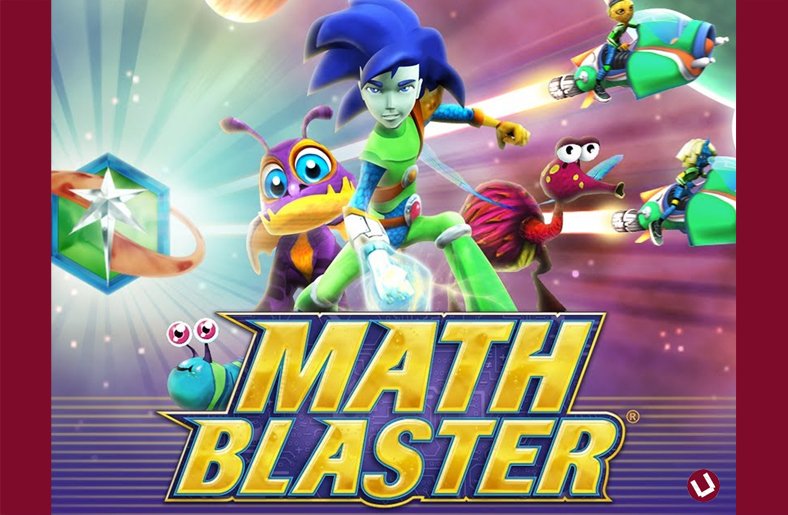In 1983, Math Blaster! was created by Davidson & Associates, a software company founded by educator Jan Davidson. The concept was simple but powerful: merge the excitement of arcade gameplay with the practice of essential math skills. Students were no longer just solving worksheets; they were blasting through space while sharpening their arithmetic. Early versions appeared on Apple II, Commodore 64, and Atari systems, making it one of the pioneering titles in educational gaming.
The idea resonated because children were already fascinated by video games. By placing math problems inside this engaging format, educators and parents suddenly had a new tool that could hold attention and promote practice.
How It Evolved Over the Decades
Math Blaster didn’t stay static. Instead, it grew and adapted to new technology:
- 1987 brought Math Blaster Plus!, which offered better graphics and more interactive features.
- By 1990, New Math Blaster Plus! refined gameplay and introduced smoother interfaces.
- In 1993, Math Blaster Episode I: In Search of Spot introduced story-driven gameplay. Players were not just solving math problems they were saving characters like Blasternaut and Spot in adventures that felt cinematic.
- Spin-offs followed: Math Blaster Jr. for preschoolers, Alge-Blaster for older kids, and versions focusing on topics like pre-algebra and fractions.
By the 2000s, Math Blaster was available as online browser games and later as mobile apps. For decades, it remained one of the most recognizable names in edutainment. However, in July 2023, JumpStart Games officially ended support, closing an important chapter in educational game history.
Gameplay and Learning Approach
The heart of Math Blaster was its ability to disguise math practice as play. Instead of pen-and-paper drills, students solved problems while flying spaceships, completing missions, or rescuing characters.
Each correct answer moved the story forward. Many versions featured adaptive difficulty: as children mastered simpler arithmetic, the game presented more complex challenges. Topics included addition, subtraction, multiplication, division, fractions, decimals, and even word problems.
Later titles added rich narratives and animated cutscenes. This combination of storytelling with math drills meant children weren’t just learning they were immersed in a world where math mattered.
Why It Was Loved
Parents and teachers embraced Math Blaster because it provided learning outcomes in a format kids enjoyed. Instead of fighting to get students to complete exercises, the game turned math into a reward.
- Practice felt natural: Kids solved dozens of problems in one session without noticing they were doing homework.
- Instant feedback: Players knew immediately if their answers were right or wrong, reinforcing the learning loop.
- Multiple learning styles: Visual learners thrived on animations, auditory learners enjoyed sounds and cues, and kinesthetic learners benefited from active gameplay.
- Confidence building: Success in levels boosted self-esteem, especially for children who often struggled with math in class.
The blend of fun and structure made it a staple in many households and classrooms.
Criticisms and Limitations
While Math Blaster was groundbreaking, it wasn’t perfect. Some educators argued that the series leaned too heavily on repetition. Early versions especially focused on speed and accuracy rather than deep conceptual understanding. For students who processed information more slowly, the fast-paced nature could feel overwhelming.
Technology also presented challenges. As computers advanced, older versions became outdated and difficult to run. While newer iterations tried to modernize, some lacked the charm and depth of the originals. By the 2010s, the rise of more adaptive learning platforms left Math Blaster feeling dated.
Finally, cost and access were barriers. Not all families could afford home computers in the 80s or 90s, which meant many children never experienced it firsthand.
The Legacy of Math Blaster
Despite limitations, Math Blaster left an undeniable mark on education. It inspired similar titles like Reader Rabbit, Carmen Sandiego, and the broader JumpStart learning series. The idea that children could learn core skills through fun digital experiences influenced decades of educational design.
For adults today, Math Blaster is often remembered with nostalgia. Many recall afternoons spent guiding Blasternaut through space missions, building not only math skills but also a fondness for problem-solving. Its cultural influence can still be seen in modern learning apps that use rewards, badges, and missions to keep learners engaged.
Why It Still Matters
Even though official support ended in 2023, the lessons of Math Blaster remain relevant. Gamified learning is now a staple in classrooms and apps worldwide. Adaptive feedback, engaging narratives, and interactive challenges are no longer novelties they are expectations.
Math Blaster demonstrated that when children are immersed in a story and motivated by play, they learn willingly. That principle continues to shape platforms like Khan Academy Kids, Prodigy Math, and countless mobile apps.
Final Thought
Math Blaster was more than a game it was a movement. It transformed math from a subject that many students dreaded into an adventure that felt exciting. While technology has moved forward, the spirit of Math Blaster lives on in every gamified learning tool that motivates students to keep playing, keep solving, and keep learning.
Its journey reminds us that education doesn’t have to be dry. With creativity, even the most challenging subjects can be turned into an engaging, unforgettable adventure.
FAQs
Is Math Blaster still available today?
Official support ended in 2023, but older versions can still be found through archives and fan communities.
What subjects did Math Blaster cover?
It started with basic arithmetic but expanded into fractions, decimals, pre-algebra, and problem-solving skills.
Who was Math Blaster designed for?
The series was built for children in elementary and middle school, with special editions for younger learners.
Why was Math Blaster so popular?
Its mix of arcade action, colorful graphics, and educational value made math fun while keeping kids engaged.
What legacy did Math Blaster leave behind?
It influenced many later edutainment titles and helped shape the modern idea of gamified learning.


